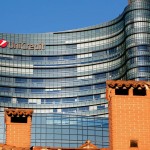Italy Forms $5.7 Billion Fund to Shake Off Doubts in Banks

-
Fund to help weakened banks sell shares and unload bad loans
-
Atlante fund managed by Quaestio Capital investment firm
Italian officials and bank executives agreed to create a multibillion-euro fund to help troubled lenders raise capital and offload bad loans, as the nation tries to assuage investor jitters.
The new vehicle will be named Atlante, private fund manager Quaestio Capital Management SGR said late Monday. It will be financed by banks, insurers and institutional investors including Cassa Depositi e Prestiti, according to the government, and worth about 5 billion euros ($5.7 billion), said Banca Popolare dell’Emilia Romagna Scarl Chief Executive Officer Alessandro Vandelli.
Italian Prime Minister Matteo Renzi is seeking to avoid creditor losses and restore investor confidence in a financial system crippled by an estimated 360 billion euros in soured loans. With the European Central Bank urging companies to clean up their balance sheets and boost capital buffers as the economy struggles to recover from a recession, the country’s lenders have been among the worst performers in Europe this year.
“This is a very, very good step in the right direction,” Marco Elser, a partner at Lonsin Capital, said in an interview with Bloomberg Television’s Guy Johnson on Tuesday. “I don’t think 5 billion euros is enough. The problem really is how to legally solve the non-performing loans — if that’s solved, then Italy is going off to the races as far as the banking system is concerned.”
The government plans to approve additional measures to ease bankruptcy proceedings and reduce time for debt recovery, Renzi said late Monday.
EU Rules
Atlante, named after a Greek mythological god, will act as a buyer of last resort for banks that struggle to raise equity capital in the private markets or that can’t sell off the riskiest portions of their bad debts. The fund is being managed by a private manager, Quaestio, because Italy doesn’t want to fall afoul of European Union rules against providing state aid. Quaestio’s shareholders include Intesa Sanpaolo SpA’s top investor, Fondazione Cariplo.
“The main function is to be a backstopper for all these capital raisings that will come,” Filippo Alloatti, a senior credit analyst at Hermes Fund Managers Ltd., said in an interview on Bloomberg TV with Manus Cranny. “It’s not a ‘bad bank.’ Of course that would have come at a conditionality. They should have done that probably in 2012.”
Bank shares swung between losses and gains. Banca Monte dei Paschi di Siena SpA rose 0.6 percent at 10:26 a.m. in Milan, after earlier surging as much as 8.4 percent, while UniCredit SpA advanced 0.2 percent and Intesa Sanpaolo slipped 2 percent. They have been among the worst performers on the Bloomberg Europe Banks and Financial Services Index this year.

Banca Popolare di Vicenza’s 200 million euros of 9.5 percent junior notes rose 5 cents to 84 cents on Tuesday, extending Monday gains, according to data compiled by Bloomberg. The ECB had said it would put the bank into resolution, imposing losses on creditors, if it can’t raise funds through an initial public offering due this month.
Adding urgency to the plan are Banca Popolare di Vicenza SCpA and Veneto Banca SCpA, which need to raise almost 3 billion euros in total to strengthen capital and avoid resolution measures over coming weeks.
UniCredit is pushing ahead with the initial public offering of Pop. di Vicenza that it’s running. The lender will start gathering orders for the IPO on April 19 and shares should begin trading on May 3, according to terms seen by Bloomberg.
IPO Successes
“The fund aims at ensuring the success of the capital increases required by the supervisory authority to banks that are facing market difficulties, acting as a backstop facility,” Quaestio said in a statement. The fund also will buy the junior tranches of securitized bad loans, helping lenders to deconsolidate non-performing debt from their accounts.
Quaestio, with offices in Milan and Luxembourg, had 10 billion euros of assets under management as of June 2015, according to its website.
“They explained the terms of the issue,” Banca Popolare dell’Emilia Romagna’s Vandelli said. “We look forward to receiving documentation from the ministry, so we can submit it to our boards later.” The stake for state lender CDP has yet to be quantified, he added.
To help stabilize the financial system, the Italian government earlier this year reached an agreement with the European Commission allowing banks to bundle their bad loans into securities for sale, while purchasing a state guarantee for the least-risky portion to make the debt more appealing to investors.
As part of the country’s consolidation efforts, Banco Popolare SC and Banca Popolare di Milano Scarl last month agreed to form Italy’s third-largest bank through an all-stock deal. It’s the biggest transaction in Italy since Banca Monte dei Paschi’s 9 billion-euro acquisition of Banca Antonveneta SpA in 2007.
“The Italian banking system has been under-capitalized, it had too high levels of NPLs, many banks have had weak management and the economic impact has been negative because banks haven’t been strong enough to provide credit,” Bob Parker, a senior adviser at Credit Suisse Group AG, said in an interview with Bloomberg TV. “A reboot of the banking system is very important, sorting out these NPLs is very important. It’s not going to happen overnight.”
Source: Bloomberg





























